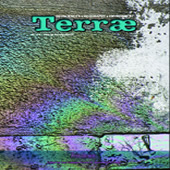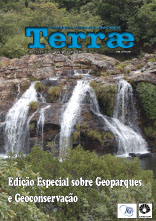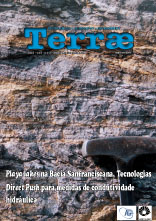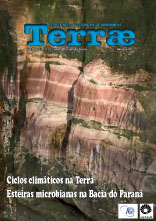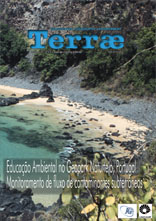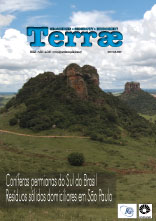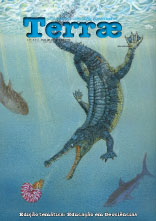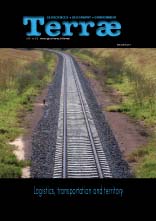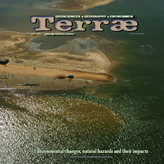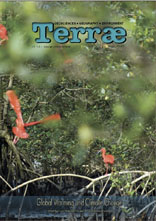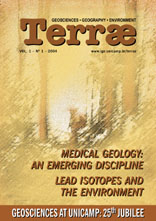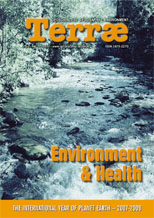Save the date / Call for papers
A revista Terræ publica simultaneamente as edições online de 2016 e 2017. As edições impressas acham-se temporariamente suspensas, pois os editores reconhecem que a internet oferece formas mais eficazes para disseminar rapidamente os resultados das pesquisas. As reformulações do periódico objetivam ampliar a abrangência, combinando redução de custos com rapidez de publicação. Cada vez mais a revista consolida a tendência de cobrir temas multidisciplinares que revelem formas de interação das Geociências com as diferentes áreas do conhecimento humano. A edição de Terræ 2017 é inteiramente dedicada ao tema GEOPARQUES.
A revista aceita trabalhos e comunicações em Português, Inglês e Espanhol.
Chamada de trabalhos / CALL FOR PAPERS
Uma vez recuperado o tempo de ausência na web, a edição de Terræ 2018 tornar-se-á uma boa opção para publicação de artigos científicos. O volume deverá reunir contribuições referentes a GEOÉTICA, tema que permite acomodar abordagens diferenciadas que revelem as inter-relações entre a sociedade e os ecossistemas terrestres.
O sistema de submissão e avaliação de artigos científicos está em pleno funcionamento, sendo feito exclusivamente pelo E-mail: terrae@ige.unicamp.br. Nosso sítio web está à sua disposição.
Esperamos sua visita e participação!
Os editores.
10/01/2018- 16:31 pm
Chamada de trabalhos/ Call for papers para o Volume 15, 2018
Novas contribuições são aceitas para o volume 2018 de Terræ.
Data limite 30.abril.2018
10/01/2018- 16:31 pm
Chamada de trabalhos/ Call for papers para os eventos:
VIII GeoSciEd 2018 – the 8th Quadrennial Conference of the
International Geoscience Education Organisation (IGEO)
– Geosciences for Everyone –
VIII Simpósio Nacional de Ensino e História de
Ciências da Terra / EnsinoGEO-2018
– Geociências para Todos –
Campinas – Sao Paulo – Brazil, July 2018
Acesse o site: http://www.ige.unicamp.br/geoscied2018/en/.
Data limite 11.fevereiro.2018
11/01/2018- 13:40 pm
Livro "Geologia do Brasil”, 2012: Reserve já seu exemplar, sem despesas de remessa.
Visite o endereço eletrônico: www.editorabeca.com.br
Os editores
Campinas, janeiro de 2018.
Elements of a Heavy Oil Technology Development Program
Osvair V. Trevisan
Department of Petroleum Engineering, Unicamp
trevisan@dep.fem.unicamp.br
Fernando A. França
Department of Petroleum Engineering, Unicamp
Clarissa A. Okabe
Department of Petroleum Engineering, Unicamp
Antônio C. Lisboa
Department of Chemical Engineering, Unicamp
ABSTRACT
Prospective studies point out that in the short to medium-term, Brazil will incorporate 4 billion barrels to its proved reserves of heavy oil due to advancements in production techniques. As a result, Brazilian reserves of heavy oil will reach 7 billion barrels, taking more than a 40% share in the proven volumes. These figures do not account for the reserves of 2 billion barrels of extra-heavy oils that exist in the offshore field of Membro Siri, Campos Basin. Advancements in heavy oil production techniques will certainly match those numbers as they may unveil new scenarios and even bring closer the production onset of extra-heavy oils from off-shore fields.
Around the world heavy oil has been discovered when looking for conventional oil; and its reservoirs have generally been produced by applying the same techniques as those in the production of light oil. The predictable consequence is that the remaining resources associated with conventional oils have a smaller participation in available natural energy resources, increasing the importance of those resources associated with heavy oils. On the production side, worldwide the percentage of heavy oils is now slightly over 10%; in Brazil the proportion is still negligible.
However, in order to assure the present favorable demand-production relationship, the medium term perspective requires that the Brazilian share of such oils be above 20% of total produced volume. To accomplish this, the country must develop an integrated program of technology development. The program must focus on the search for technological solutions supported by scientific knowledge to overcome the challenges associated with the explotation of heavy oil reservoirs located in Brazil’s coastal waters. Seeking to supplement the efforts of specific corporate programs, technical managers from oil companies and members of the academic community have convened to propose prospective solutions and to set the priority for 40 previously selected projects. The present paper unveils the main conclusions drawn, starting from the challenges posed by all branches of the area, to the actions envisioned to tackle them.
A PDF reader is required to view the article files. Make the download here: Adobe Acrobat or Foxi


